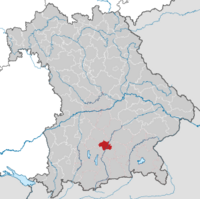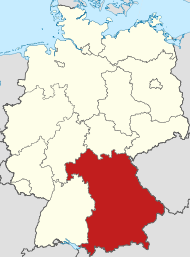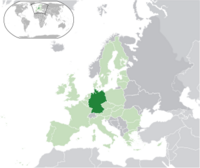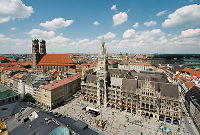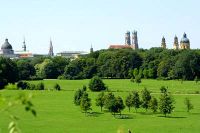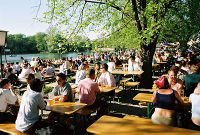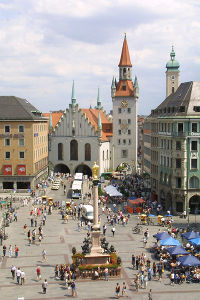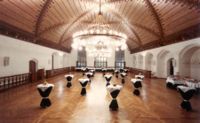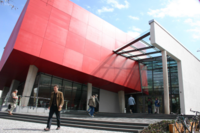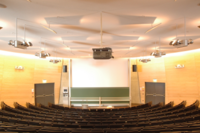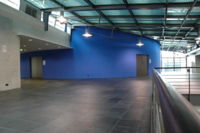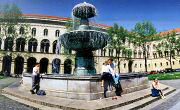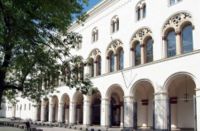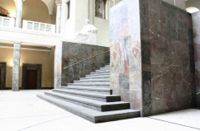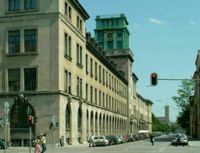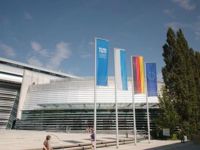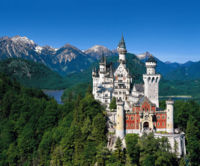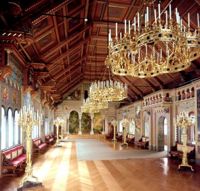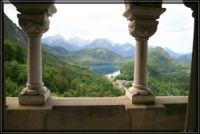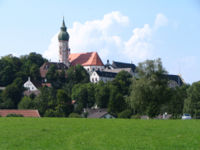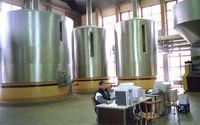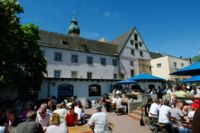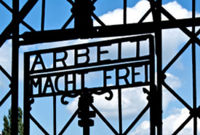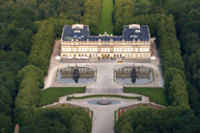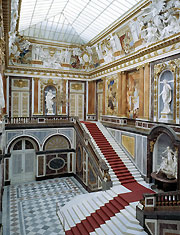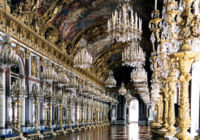DebConf11/Munich
[edit] Introduction
Munich is located in south Bavaria, which is a region of Germany, which again lies in the middle of Europe:
We believe Munich would be a great place to host Debconf11. Not only is it always worth a visit with its many historic buildings, parks and beergardens. Munich is also one of Debian's biggest success stories, with the City of Munich's LiMux project migrating all the City administration's desktops to a Debian-based GNU/Linux desktop. This bid is backed by both the vibrant Debian community in Munich (which has traditionally had one of the largest Debian Developer concentrations in the world and has hosted several events already) and the LiMux project (three project members are part of our local team) with an endorsement by the head mayor of Munich, Christian Ude. This has made it e.g. possible to propose the "Historische Festsaal" in the historic city centre as venue for the Debian Day and should prove very useful otherwise when negotiating with local companies, hostels/hotels or organisations.
[edit] About Munich
(English wikipedia has a good overview page for Munich)
Munich is a big enough city that you can get basically anything you are looking for - be it artsy independent french cinema, dancehall parties, U2 playing in the olympic stadium (ok, only once a year), top-notch operas in the Nationaltheater or surfing the standing wave in the Englischer Garten. On the other hand, it is small enough that there are still lots of small shops by local artists and merchants in the boroughs of Schwabing, Haidhausen or Glockenbach and due its very good public transport system, you can be in the upper bavarian countryside like Lake Starnberg or hiking near Bayrischzell in no time.
Around 1.3 million people live in the city of Munich, the surrounding metropolitan area has a population of over 5 million people. Munich has the strongest economy in germany, hosting many IT and hight-tech related companies, as well as media, publishing and finally industrial global players like BMW or Siemens. The public transport system is one of the most comprehensive and dense in the whole world.
Munich is one of germany's most visited cities by tourists from all over the world. As a major center of commerce, industry and IT, it has attracted people from all over germany, europe and the world to work and live at. Another big part of the population are the 100000 students, enrolled at either one of the two major universities (the Technical University of Munich and the Ludwig-Maximilians University) or one of the several other smaller universities and colleges. Finally, Munich might be unique among Germany's major cities in sofar as it has retained a strong local cultural bias. This can not only be seen at the Oktoberfest, but also in the many beergardens and parks in Munich, where the city-live is slowed down. Especially the landscape and countryside outside of Munich including the lakes and the nearby Alps have proven to be fantastic recreational areas for Munich people and tourists alike.
[edit] Local Team
We believe a particular strength of our bid is the strong and diverse local team. We have long standing and DebConf-experienced Debian Developers, LiMux project leaders and university faculty staff. Some of our team members have strong experience in organizing bigger conferences as well.
Our local team members are:
- Andreas Barth
- Debian Developer since 2004
- Attended Debconfs 5, 6, 7 and 9
- Yearly (co-)Organizer for a 200+ non-commercial conference in southern Germany
- Former Debian Release Manager
- Michael Banck
- Debian Developer since 2001
- Attended Debconfs 3, 6, 7 and 9
- Co-organizer of the Debian Systems expo booth and several BSPs in Munich
- Jan Marek Glogowski
- LiMux Developer since 2005
- Attended Debconf 7
- Organizer of two BSPs in Munich
- Participated in several Debian and LiMux booths (CeBit, Linux Tag, Systems Munich)
- Christian Grothoff
- GNU maintainer since 2002
- Faculty member of the CS department, Technische Universität München (TUM)
- Experienced organizing conferences (FRACTAL, FRISC, LUG Camp, RMIPv6 Summit)
- Alexander Reichle Schmehl
- Debian Developer since 2006
- Attended DebConf 3, 5, 6, 7 and 9
- Helper at DebConf 3 and 5
- Organizer at DebConf 6 (and a little bit at 7)
- Debian Press Team
- Florian Schießl
- Communication & community affairs, free software & open standards, City of Munich, LiMux project
- Attended DebConf9
- Organized many events and booths for LiMux since 2005, contact person to city, state and federal government
- Johann Felix Soden
- Debian Maintainer since 2009
- Christoph Egger
- Debian Developer since 2009
- Attended DebConf 9
- Robert Jaehne
- LiMux Developer since 2008
- Attended DebConf 8 and 9
[edit] Getting There
Munich can be easily reached by rail, road and air. In fact, next to New York City, is it probably among the best reachable proposed Debconf locations yet.
Munich's airport (MUC) is the main Lufthansa/Star Alliance hub besides Frankfurt/Main, servicing 250 destination in 68 countries. Direct connections include the following major intercontinental cities: New York City, Boston, San Fransisco, Chicago, Atlanta, Vancouver, Los Angeles, Toronto, Washington DC, Philadelphia, Montreal, Tokio, Peking, Sao Paulo and Delhi.
Direct european connection include London, Paris, Madrid, Barcelona, Edinburgh, Manchester, Dublin, Oslo, Kopenhagen, Stockholm, St. Petersburg, Moscow, Tel Aviv, Istanbul, Cairo, Athens, Lissabon, Marseille, Bruxelles, Amsterdam, Warschau, Vienna, Budapest, Bukarest, Belgrad, Sarajevo and Sofia. Also some budget airlines fly to Munich. It takes about 3/4 of an hour to transit from Airport to the venue by public transport (~10 Euro), and about 20 minutes by Taxi (~50 Euro).
Munich is also a major train hub, including direct connections to all major cities in Germany (Berlin, Hamburg, Cologne, Frankfurt), and direct international trains to Austria (Vienna, Salzburg), nothern Italy (Verona, Milan), France (Paris, Strasbourg), Switzerland (Zurich) and Czech Republic (Prague). Notable one-stop connections include London (via Paris), as well as Bruxelles and Amsterdam (via Cologne).
[edit] Network
TODO: rewrite, mention latency to Darmstadt) Debian hosting facility
We have currently venue offers from three different universities. All share the same network connection provided by the Leibniz Rechenzentrum (LRZ) to the outside world. All universities in Munich are Gigabit-connected to the German scientific network (DFN) via the LRZ. We can host hardware in any university in Munich with minimal latency during the conference. We'll probably get our own subnet for wired and wireless connections during the conference (we could use the wireless default network during Debcamp, until we bring up our own network, and during teardown phase).
The buildings itself are all equipped with wired and wireless connections, though we need to add more wireless due to our heavy usage (but we can use the wired connectors for that).
For DebianDay, we plan to use another location (see below).
[edit] Debian-Day Venue
DebianDay would happen in the festival room of the old city hall directly at Marienplatz. Around 400 people can be hosted there. Food will be catering or city hall canteen on that day (~10 minutes from venue).
[edit] Main Venue: Munich University of Applied Sciences (Hochschule München)
The conference would take place in the building of the Department of Mathematics and Computer Science. We got full support by the department. I.e., the venue would be free of charge except for additional 24x7 security beyond regular opening hours.
[edit] Connections
From Stachus (main public transport station):
- Public Transport Connection: Tram 20/21 - 8 minutes
- Walking distance: - 20 minutes walk
From the central station (Hauptbahnhof) / hostels:
- Public Transport Connection: Tram 20/21 - 5 minutes
- Walking distance: - 15 minutes walk
[edit] Status
- We get full support from the CS department. As a result we don't have to pay fees for the venue.
- The venues has a big subterrain car park, we can use for free. As the conference will take place in the semester holidays, it'll be allmost empty.
- There are many small rooms for 20-30 people (normally used for classes) some medium sized rooms and two larger rooms with 300+ fixed seating (lecture hall). The two rooms can be connected via a video stream and are fully equiped with video and audio equipment, which is also available in many of the smaller rooms.
- Normal opening time is 8am to 8pm. The venue is protected by an external security company. Extensions of the opening hours is possible, we just have to pay for the extended security (very cheap).
- For the DebCamp smaller rooms can be easily provided in the week before the conference.
- We have currently blocked the rooms for the last week 2011-08 and first week of 2011-09. Currently no other rooms are booked for 2011; we should block them as soon as possible, as they are already booked for 2010 by an other conference.
- We have blueprints of the buildings
- Food in the same building
- Just use "any" rooms as special rooms - we have too many anyways.
- The whole "hallway" can be used as social area and for catering, as it has a sprinkler installation. There had been official dinners the hallway with 300+ people at the university.
- Across the road is a small park.
- The german student union is running a small cafeteria inside the building, the student canteen is about 400m away, also run by the union. If we prefer staying in the venue, we can go for catering.
- A supermarket and a bakery are in a walking distance (two minutes).
[edit] Backup Venue: Universität München (LMU)
Alternatively, the conference could take place in the venerable main building of Ludwigs-Maximilians Universität (LMU). We have an offer for adequate rooms at 2000 €, through support by the institute of computer science. The venue would be only two blocks away from Englischer Garten, Munich's biggest park, and is at the same time located right in the center of Schwabing, Munich's student borough.
[edit] Connections
A subway stop ("Unversität") is directly next to the building. Night bus line N40 runs every hour (every half hour on weekends) during the whole night and connects directly with Stachus, the main public transport hub at night.
Walking from either central station or Stachus to the venue would take about 25-30 minutes.
[edit] Status
- We get full support from the CS department. Fee is currently ~2k
- This fee would include two large lecture halls for the main talks and 4-5 seminar rooms for BoF sessions or as hack labs
- We have positive feedback from the person responsible for the room allocations
[edit] Backup Venue: Technische Universität München (TUM)
The main campus of the Technical University (TUM) is located very close to the city center, directly next to the Kunstareal, Munich's musem quarter, while just one block away from Schwabing's university district with plenty of bars and restaurants. The conference would take place in the Theresianum, part of the main building.
[edit] Connections
The Tram stop ("Pinakotheken") is a five minute walk. Alternatively, the Subway stop "Theresienstraße" on the U2 line is the same distance away and connects directly to central station in 3 minutes.
From Stachus (main public transport station name):
- Public Transport Connection: Tram 27 - 10 minutes
- Walking distance: - 15 minutes walk
From the central station (Hauptbahnhof) / hostels:
- Public Transport Connection: Subway U2 - 13 minutes
- Walking distance: - 15 minutes walk
[edit] Status
- We have positive feedback from the person responsible for the room allocations
- We have reserved 2x200 seat, 2x100 seat, 1x30 seat lecture halls in the Theresianum (prices to be negotiated)
- More seminarrooms are probably possible, but need to be negotiated with different persons each
- Dates are set to 21st-28th August 2011 for Debconf
- Debcamp needs to be located in different location (e.g. the LMU venue)
[edit] Food
Debconf-Food is available either via the mensa (15 Euros / day or less (discussion not finished yet)), or we can use caterers => we will do what is the best in the end.
Food is available as self-service or buffet. We can provide food for vegetarian / vegan / lactose-intolerant / gluten-sensitive / religious (of any denomination) people. Vegetarian food is same price as normal food, any other is still reasonable priced (due to the small number not really a point of concern).
We don't expect to have food reappearances, except for vegetarians or special ones during debcamp.
[edit] Handicapped people
All venues are accessible for handicaped people. There are no steps within the building (except between different floors), and always hot-standby elevators between floors. All universities have handicaped students since many years. Also, all public transport is available for handicaped people.
[edit] Accomodation
[edit] Hostels
- How much does it cost per person per night?
- 20-25 Euro
- Is the place where people are going to sleep near the conference facilities?
- yes - 5 minutes public transport, 15 minutes walk
- Is it able to handle a varying number from 200 to 500 people?
- yes.
- Is it able to handle non-native speaking people? (i.e. do the people at the sleeping facilities speak English?)
- yes - they live from abroad tourists.
- Will there be a need of a "Debconf" info-desk, or would the local (hotel or such) people be able to handle that themselves? (See InfoDesk for details on duties)
- Will it be possible for couples to stay in their own rooms?
- ?
- How many room keys would be available?
- ?
- Are there rooms ready for handicapped people? How many?
- yes, enough.
[edit] Nearby Hotels
- Hotel Koenigswache
- http://www.koenigswache.de/?lang_G=en
- single room: 93€
- double room: 115€
- 5 min walk to DC-venue
- Hotel Theresia
- http://www.hoteltheresia.de/e_index.htm
- single room: 46€
- double room: 64€
- 3 min walk to DC-venue
- Pension Geiger
- http://www.pensiongeiger.de
- single room: 45€
- double room: 66€
- 3 min walk to DC-venue
[edit] Fun and Free time
Munich has plenty to offer at any time:
- German Museum, the largest technology-oriented museum in the world
- Lots of other Museums, including the Pinakotheken and Lenbachhaus at Kunstareal
- Englischer Garten, Munich's biggest park and recreational area, including several big beergardens and a place to do surfing
- Hofbräuhaus and lots of other beer halls
Munich is better known for its high culture (opera, [theatre, classical concerts, jazz) than its sub-culture (where Berlin and Hamburg certainly shine more), but you will be able to find interesting concerts at nearly every day of the week for whatever musical style you like.
For nightlife, several bar/club-centers exist, including the Kultfabrik, Optimolwerke, Feierwerk and Backstage. Several clubs have recently opened up or moved to Sonnenstraße which is only a couple of minutes from the proposed hostels.
[edit] Day Trip Proposals
[edit] Isar raft ride
- http://www.youtube.com/watch?v=n9-gN3MS22M
- gastronomic specialities (beer, brezn, roast pork)
- Is the proposed location ready to receive people with disabilities?
- no
- http://www.youtube.com/watch?v=n9-gN3MS22M
[edit] Neuschwanstein Castle (plus mountains around)
- http://www.neuschwanstein.de/englisch/palace/index.htm
- "Neuschwanstein Castle can only be visited within a guided tour. We offer guided tours in German and English by our own personnel. Visitors who do not speak one of these languages can make use of our audio guide tours, which are available in Japanese, French, Spanish, Italian, Czech, Slovenian, Russian, Polish, Chinese (Mandarin), Portuguese and Hungarian."
- Is the proposed location ready to receive people with disabilities?
- During the regular tour you will have to climb 169 steps and descend 204.
- Near the castle there is a toilet for the disabled.
[edit] Andechs and Dießen
- centuries old brewery
- benedictine monastery
- http://www.andechs.de/englisch/kloster/
[edit] Dachau - Concentration Camp Memorial
- http://www.kz-gedenkstaette-dachau.de/english.html
- Is the proposed location ready to receive people with disabilities?
- The Memorial Site is accessible to people with disabilities and is equipped with accessible restrooms. Wheelchairs can be borrowed from the museum staff. Please note however that much of the grounds are unpaved and access for wheelchairs may be difficult. There are also some buildings that do not have a wheelchair entrance.
[edit] Herrenchiemsee Palace
- http://www.herrenchiemsee.de/englisch/n_palace/index.htm
- Is the proposed location ready to receive people with disabilities?
- "Paths to the various buildings are sign-posted. The buildings are accessible for wheelchairs. Toilets are available in the visitor centre, the Schlosshotel, the Museum in the Augustinian Monastery and the Royal Palace. In the Museum in the Augustinian Monastery and the Royal Palace there are lifts."
- Zugspitze
- ~2960m - germanys highest mountain
- How expensive would that be?
- 20~30 Euro / person
[edit] Potential Local Sponsors
We have not contacted local sponsors yet, as many of them are also past Debconf sponsors, and we wanted to coordinate sponsor acquisition with the Debconf10 team first. However, we have intensively discussed and assembled a list of potential local sponsors:
- Open Source related
- City of Munich / Limux
- Gonicus
- Red Hat
- Linux New Media
- OpenSourcePress
- IT companies with local offices in Munich
- IBM
- Sun
- Intel
- Big Munich-based companies
- Süddeutscher Verlag
- BMW
- Siemens
- Allianz
- Münchner Rück
- Hypo-Vereinsbank
- Infineon
- MAN
- Linde
- Large companies with large local offices and social engagement
- E-on
- M
- Local Transport
- MVG (city-owned)
- Veolia/BOB
[edit] Timing
We have to schedule Debconf during the university summer vacations in order to get the venues. We prefer organizing it at the end of August or the beginning of September. Most of July and August are peak season for tourism and negotiating accomodation will be more difficult. Later in September, the Oktoberfest season starts which makes it equally difficult to find accomodation. Finally, it has to be made sure that no major trade fair will happen on the desired date.
